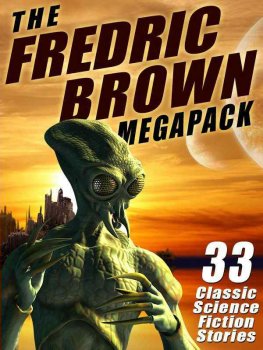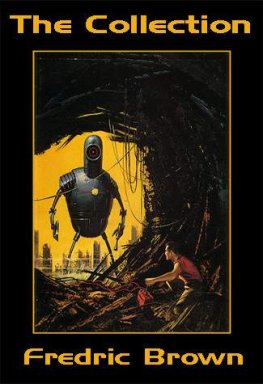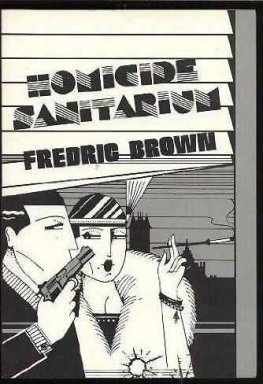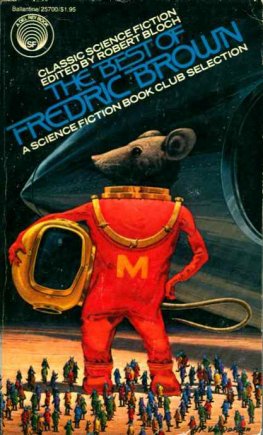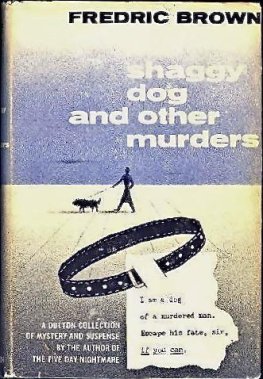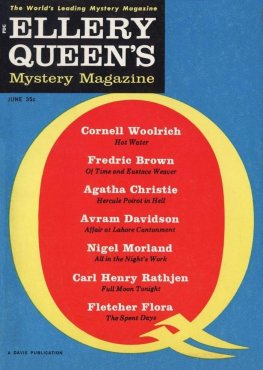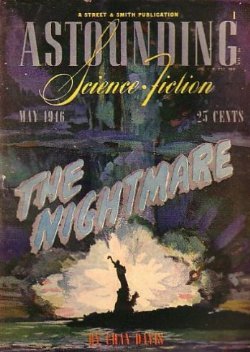The Second Fredric Brown Megapack
27 Classic Science Fiction Stories
A Note from the Publisher
Fredric Brown (1906-1972) is perhaps best remembered for his use of humor and his mastery of the short-short form (these days called flash fiction)stories of one to three pages, often with ingenious plotting devices and surprise endings. He was just as accomplished in the mystery field as in science fiction, and he won an Edgar Award from the Mystery Writers of America for his first novel, The Fabulous Clipjoint.
I discovered Fredric Browns work in the mid 1970s through the wonderful Science Fiction Hall of Fame anthology series. The concept of the series was that each volume contained some of the greatest science fiction stories published before 1965, as voted on by the membership of the Science Fiction Writers of America (and then winnowed down by each volumes editor). The theory being, of course, that science fiction writers ought to know the best of the best.
SFWA members selected Fredric Browns story Arena, which is in the first of our Fredric Brown Megapacks (this is the second, and I hope there will be a third!), as one of the top 20 science fiction stories. (Arena was also adapted as an episode of the original Star Trek TV seriesyou will probably recognize it as soon as you start reading.)
Whether you discovered Fredric Browns work through the Megapack series, already know how great he is, or are experiencing him for the first timehere are 27 more great tales.
Enjoy!
John BetancourtPublisher, Wildside Press LLCwww.wildsidepress.com
Definitions from the school-abridged Webster-Hamlin Dictionary, 1998 edition:
wavery (WA-veir-i) n. a vaderslang
vader (VA-der) n. inorgan of the class Radio
inorgan (in-OR-gan) n. noncorporeal ens, a vader
radio (RA-di-o) n. 1. class of inorgans 2. etheric frequency between light and electricity 3. (obsolete) method of communication used up to 1957
* * *
The opening guns of invasion were not at all loud, although they were heard by millions of people. George Bailey was one of the millions. I choose George Bailey because he was the only one who came within a googol of light-years of guessing what they were.
George Bailey was drunk, and under the circumstances one cant blame him for being so. He was listening to radio advertisements of the most nauseous kind. Not because he wanted to listen to them, I hardly need say, but because hed been told to listen to them by his boss, J. R. McGee of the MID network.
George Bailey wrote advertising for the radio. The only thing he hated worse than advertising was radio. And here on his own time he was listening to fulsome and disgusting commercials on a rival network.
Bailey, J. R. McGee had said, you should be more familiar with what others are doing. Particularly, you should be informed about those of our own accounts who use several networks. I strongly suggest
One doesnt quarrel with an employers strong suggestions and keep a two-hundred-dollar-a-week job.
But one can drink whisky sours while listening. George Bailey did.
Also, between commercials, he was playing gin rummy with Maisie Hetterman, a cute little redheaded typist from the studio. It was Maisies apartment and Maisies radio (George himself, on principle, owned neither a radio nor a TV set) but George had brought the liquor.
only the very finest tobaccos, said the radio, go dit-dit-dit nations favorite cigarette
George glanced at the radio. Marconi, he said.
He meant Morse, naturally, but the whisky sours had muddled him a bit, so his first guess was more nearly right than anyone elses. It was Marconi, in a way. In a very peculiar way.
Marconi? asked Maisie.
George, who hated to talk against a radio, leaned over and switched it off.
I meant Morse, he said. Morse, as in Boy Scouts or the Signal Corps. I used to be a Boy Scout once.
Youve sure changed, Maisie said.
George sighed. Somebodys going to catch hell, broadcasting code on that wave length.
What did it mean?
Mean? Oh, you mean what did it mean. UhS, the letter S. Dit-dit-dit is S. SOS is dit-dit-dit dah-dah-dah dit-dit-dit.
O is dah-dah-dah?
George grinned. Say that again, Maisie. I like it. And I think you are dah-dah-dah too.
George, maybe its really an SOS message. Turn it back on.
George turned it back on. The tobacco ad was still going. gentlemen of the most dit-dit-dit-ing taste prefer the finer taste of dit-dit-dit-arettes. In the new package that keeps them dit-dit-dit and ultra fresh
Its not SOS. Its just Ss.
Like a tea-kettle, orsay, George, maybe its just some advertising gag.
George shook his head. Not when it can blank out the name of the product. Just a minute till I
He reached over and turned the dial of the radio a bit to the right and then a bit to the left, and an incredulous look came into his face. He turned the dial to the extreme left, as far as it would go. There wasnt any station there, not even the hum of a carrier wave. But:
Dit-dit-dit, said the radio, dit-dit-dit.
He turned the dial to the extreme right. Dit-dit-dit.
George switched it off and stared at Maisie without seeing her, which was hard to do.
Something wrong, George?
I hope so, said George Bailey. I certainly hope so.
He started to reach for another drink and changed his mind. He had a sudden hunch that something big was happening, and he wanted to sober up to appreciate it.
He didnt have the faintest idea how big it was.
George, what do you mean?
I dont know what I mean. But Maisie, lets take a run down to the studio, huh? There ought to be some excitement.
* * *
April 5, 1957; that was the night the waveries came.
It had started like an ordinary evening. It wasnt one, now.
George and Maisie waited for a cab, but none came so they took the subway instead. Oh yes, the subways were still running in those days. It took them within a block of the MID Network Building.
The building was a madhouse. George, grinning, strolled through the lobby with Maisie on his arm, took the elevator to the fifth floor, and for no reason at all gave the elevator boy a dollar. Hed never before in his life tipped an elevator operator.
The boy thanked him. Better stay away from the big shots, Mr. Bailey, he said. Theyre ready to chew the ears off anybody who even looks at em.
Wonderful, said George.
From the elevator he headed straight for the office of J. R. McGee himself.
There were strident voices behind the glass door. George reached for the knob, and Maisie tried to stop him.
But George, she whispered, youll be fired!
There comes a time, said George. Stand back away from the door, honey.
Gently but firmly he moved her to a safe position.
But George, what are you?
Watch, he said.
The frantic voices stopped as he opened the door a foot. All eyes turned toward him as he stuck his head around the corner of the doorway into the room.
Dit-dit-dit. he said. Dit-dit-dit.
He ducked back and to the side just in time to escape the flying glass as a paperweight and an inkwell came through the pane of the door.
He grabbed Maisie and ran for the stairs.
Now we get a drink, he told her.
* * *
The bar across the street from the network building was crowded, but it was a strangely silent crowd. In deference to the fact that most of its customers were radio people, it didnt have a TV setbut there was a big cabinet radio, and most of the people were bunched around it.
Dit said the radio.


